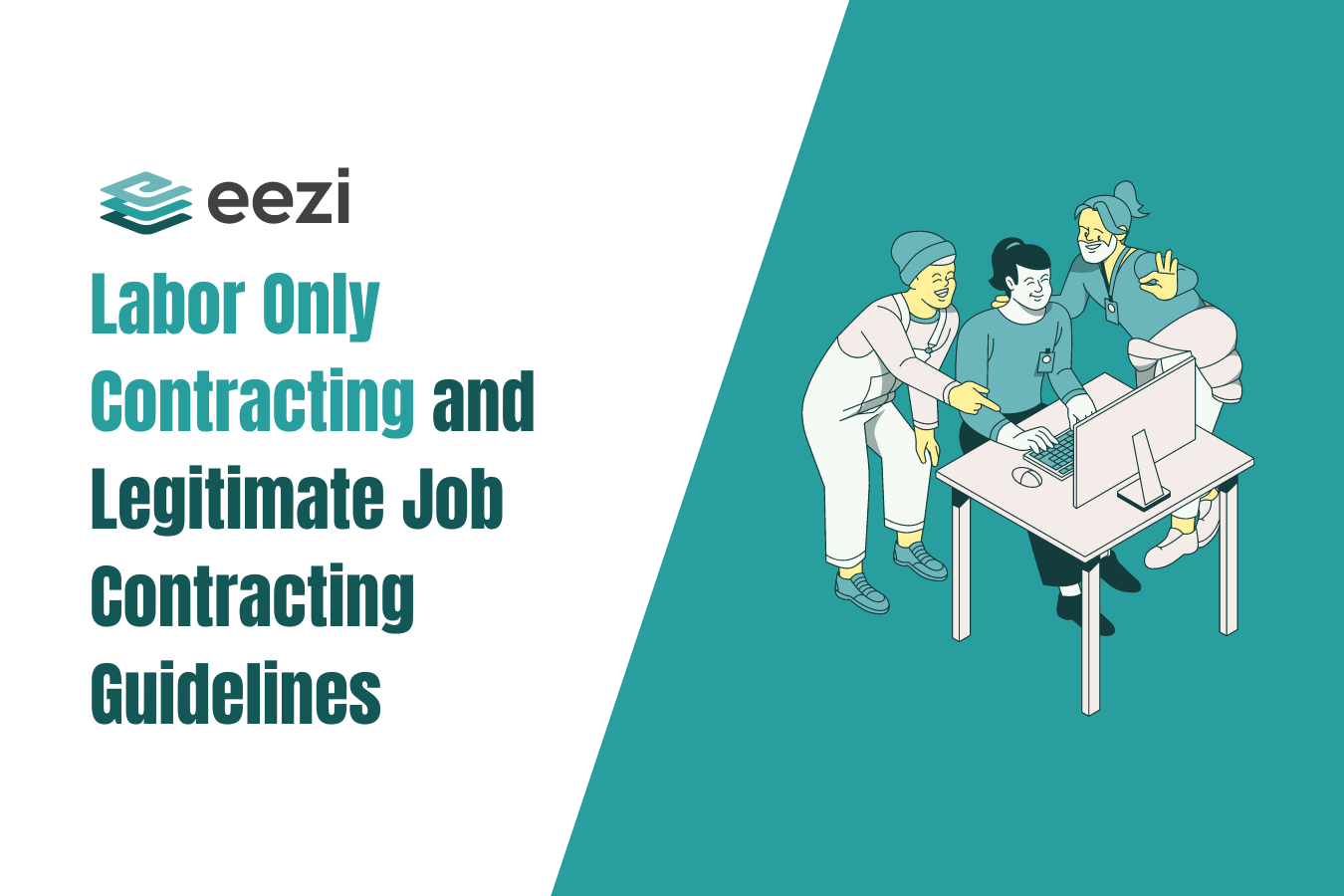What are labor-only contracting and legitimate job contracting? Learn about the differences and the guidelines for each of these cases.

What is labor-only contracting?
Labor-only contracting is an employment arrangement where a contractor or subcontractor hires and supplies workers for a project. The principal or project proponent, typically not directly associated with the contractor, can be the client.
Moreover, labor-only contracts are labor-only because workers receive only their wages and do not obtain materials from the contractor. Hence, they are labor-only. Additionally, the workers carry out the project according to the principal’s directions.
The government allows legitimate service and job contracts as they promote job creation, retention, and enhancement. These contractors have substantial capital, follow National Labor Relations Commission rules, employ workers directly, provide necessary resources, and ensure occupational safety during project execution.
Generally, a contractor or subcontractor is presumed to be a labor-only outfit. Furthermore, this stands unless the independent contractor can provide evidence otherwise. To do this, the conditions that are directly related to the contractual agreement they need to satisfy are as follows:
- Substantial capital
- Directly-employed labor force
- Contract-compliant work premises
- Appropriate tools, equipment, and machinery
- Employment arrangements to ensure hazard-free working conditions and appropriate compensations for all the employees hired.
Is labor-only contracting allowed by the Philippine Labor Code?
Labor-only contracting is illegal in the Philippines under the Philippine Labor Code. The Secretary of Labor and Employment has the authority to regulate all contracting and subcontracting arrangements in the country, and labor-only contracting does not establish a proper employer-employee relationship. This arrangement violates Philippine labor laws and regulations.
In labor-only contracts, the principal is the employer of the contractor’s workers. As such, they can be held liable for various labor-related issues, including wrongful dismissals, monetary disputes, claims, and damages.

What is the difference between labor contracting and labor-only contracting?
Labor-only contracting
Labor-only contracting is an arrangement where a contractor or subcontractor primarily acts as a recruiter, sourcing workers and assigning them to a project for a principal. However, the contractor lacks an independent business and cannot guarantee proper wages and benefits for the workers. They rely on the principal for compensation, and this arrangement is not independent.
Labor contracting
In contrast, labor contracting involves a formal written agreement between the principal and a service provider. This agreement outlines worker roles, wages, benefits, and working conditions. Moreover, the contractor typically has substantial capital and can independently ensure worker wages and benefits in a labor contracting arrangement. The principal is not responsible for worker welfare or compensation in this scenario.
eezi HR Guide
Learn the efficient ways to set up your HR department.
What differentiates labor-only contracting from job contracting?
Job contracting is a lawful arrangement in which a contractor provides specific services to a principal. In this setup, the principal retains the right to control and supervise the project, determining its outcome and work processes. The contractor is responsible for supplying the workforce, materials, tools, and any necessary services as agreed upon.
Moreover, the contractor provides the following:
- The work pool
- Materials
- Form of tools (equipment)
- Other job, work, or service(s) required by the principal to get the job done.
In contrast, labor-only contracting involves solely the provision of a workforce or labor force, which is prohibited by law. Moreover, employers engaged in labor-only contracting can face legal penalties. In such cases, the workers are considered employees of the principal, subject to all rules and regulations governing the employer-employee relationship.

What are the instances where a contractor is a labor-only contractor?
A contractor is classified as a labor-only contractor if they fall under the following criteria:
- Lack of Substantial Capital: The contractor’s entity lacks substantial capital or investment to operate as an independent business.
- Inability to Guarantee Compensation: Labor-only contractors cannot ensure the payment of wages and provide social and welfare benefits to their workforce. They must rely on the principal for funding.
- Partial Provision: The contractor can only supply part of the project requirements, such as materials, machinery, or tools, and must outsource these elements from another contractor or subcontractor.
What is a legitimate job contracting?
In contrast, legitimate job contracting involves a third party, the contractor or subcontractor, in the employment equation. In this arrangement, there is no direct employer-employee relationship between the principal and the contractor’s labor force. The principal is responsible for compensating the workers but does not supervise their work directly.
As such, a person or outfit qualifies as a legitimate job contractor when they meet these conditions:
- Substantial Capital: The contractor has substantial capital or investment to fulfill the contract’s requirements.
- Independent Execution: The contractor executes the contract based on their responsibility, manner, and method.
- Principal’s Limited Control: The principal has no direct control over how the workers perform their tasks or the project’s execution, only overseeing the final outcome.
- Contractual Entitlements: The contract specifies that the labor force receives contractual employee entitlements, including fair wages, occupational health and safety compensation, job security, and social or welfare benefits.
Related: Rules on Probationary Workers in the Philippines
What are the rights of a contractual employee in the Philippines?
Contractual employees in the Philippines have several entitlements guaranteed by labor laws, including:
- Safe Working Conditions: Employers must provide a safe and health-centric work environment to protect the well-being of contractual employees.
- Compensation: Contractual workers are entitled to receive service incentive leave, rest days, overtime pay, holiday pay, 13th-month pay, and separation or final pay.
- Retirement Benefits: If applicable, contractual employees may be eligible for retirement benefits under the Social Security System (SSS) or other retirement plans provided by the contractor.
- Social Security and Welfare Benefits: Contractual employees are entitled to social security and welfare benefits, including SSS, PhilHealth, and Pag-Ibig benefits.
- Job Security: Contractual employees should have secure employment for the entire duration stated in the contract. However, termination is possible for justifiable reasons, following due process.
- Organizational Rights: Contractual workers have the right to self-organization, collective bargaining, and peaceful concerted action. They can join or form employee unions, engage in collective bargaining agreements, and participate in peaceful demonstrations or protests.
Ensure every work time rendered is work time paid
Creating, processing, and managing your payroll doesn’t have to be stressful and challenging! With eezi, regardless of whether your employees are full-time or contractual, you can easily keep track of their work hours rendered and compute their work hours accurately!



